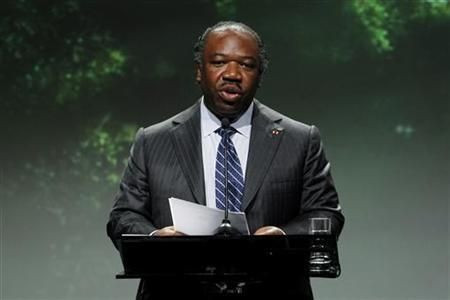Sacre Bleu! After More Than 120 Years Of French Domination, Gabon Adopts English As Official Language

The West African country of Gabon has abruptly changed the state’s official language to English from French, reportedly as a result of discontent over an investigation by French authorities into the ruling family’s assets.
The decision comes as a particular embarrassment for French President Francois Hollande, who will attend a Summits of La Francophonie this weekend in Kinshasa, Congo, which is right next door to Gabon.
Gabon, under French domination or influence since 1885, follows the example of Rwanda, which switched to English from French as its official tongue in 2009. Rwanda, a former colony first of Germany and then of Belgium, even joined the Commonwealth of Nations.
Gabon's President Ali Bongo Ondimba -- like his father, El Hadj Omar Bongo Ondimba, who served as the country's president from 1967 to 2009 -- has been accused of embezzling billions of dollars from the nation's treasury to purchase luxury items for himself and his family.
Looking into Bongo family’s assets, French investigators said they have uncovered "the cave of Ali Baba," including a portfolio of 33 luxury properties and 70 different bank accounts.
The Guardian newspaper of Britain reported that French anti-corruption authorities may soon delve into the assets amassed by other African leaders, including Burkina Faso's Blaise Compaore, Congo-Brazzaville's Denis Sassou Nguesso, and Equatorial Guinea's Teodoro Obiang Nguema Mbasogo.
The probes -- and confiscation of certain French properties -- have chilled relations between Paris and some African capitals.
However, a Bongo representative told Agence France-Presse that the change in official tongues was made because the president sees English as a “necessary working language.”
“Gabon wants to develop and give itself the best opportunities,” the representative said. “When you leave the French-speaking space, if you don't know English, you are almost handicapped. It's a question of diversifying our partnerships, ensuring that the people of Gabon are armed and better armed.”
He added: “French researchers publish in English and in most international conferences French experts contribute in English, while Africans have become practically the only people to contribute in French.”
Meanwhile, one must wonder how a sudden change to English from French will impact the tiny nation of Gabon, which is populated by a mere 1.6 million souls.
Indeed, Gabon, independent from France since 1960, has been one of Paris’ closest allies on the African continent.
Agnes Poirier, a French political commentator, speculated in the Guardian: “[W]ill the Bongos rebaptize their country's capital Libreville as Freetown (also Sierra Leone's capital city)? Will Libreville's Rue d'Alsace Lorraine become Essex Street and its ‘Le Petit Paris’ district ‘The Little London’?”
According to the CIA World Factbook, about 90 percent of Gabonese people are literate -- presumably they all speak French and/or one of the following native languages: Fang, Myene, Nzebi, Bapounou/Eschira, and Bandjabi.
Now, given the new mandate, all schools in Gabon will likely have to revamp their curricula in English, while all road signs, books, newspapers, magazines, and TV shows will similarly undergo Anglicization.
The process could take years.
However, Gabon’s sudden attraction to English may not disrupt the nation too much. With its small population, lack of ethnic conflicts, abundant natural resources, and strong foreign-aid support, Gabon is one of West Africa’s most stable and prosperous states.
© Copyright IBTimes 2024. All rights reserved.





















